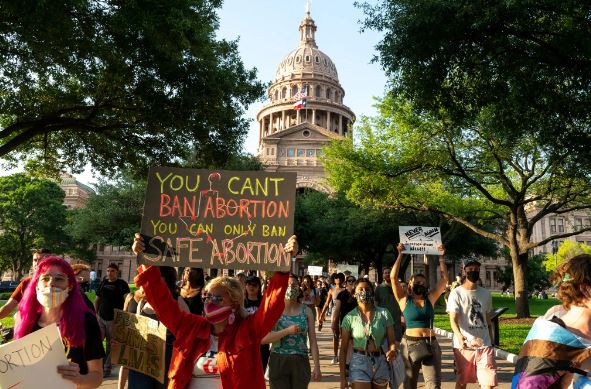A pregnant woman in Texas, facing a diagnosis of trisomy 18 in her fetus, has filed a lawsuit against the state seeking an emergency court order allowing her doctor to perform an abortion. This legal challenge, one of the first of its kind after the Supreme Court’s overturning of Roe v. Wade last year, addresses the strict abortion bans in Texas. The state has been a focal point for restrictive abortion laws, including measures prohibiting abortions from fertilization and allowing private citizens to sue those assisting women in obtaining abortions.
The lawsuit underscores the challenges faced by women with complicated pregnancies due to vague exceptions in the state’s abortion laws. Texas allows exceptions for situations that endanger the health or life of the pregnant woman, but the lack of clarity has hindered doctors from performing procedures in many cases.
The plaintiff, Kate Cox, is currently 20 weeks pregnant and received a diagnosis of trisomy 18, a condition often resulting in miscarriage, stillbirth, or infant death within the first year. Despite experiencing pain and discharge and making visits to the emergency room, Ms. Cox, a 31-year-old mother of two from the Dallas area, has been informed that she must continue her pregnancy under Texas law.
Ms. Cox’s emergency appeal coincides with the Texas Supreme Court’s consideration of a broader effort by abortion rights advocates and affected women. The ongoing case seeks clarification from state officials on the circumstances under which doctors can perform abortions without facing civil or criminal penalties. Filed by the Center for Reproductive Rights, the suit, known as Zurawski v. State of Texas, has the potential to set guidelines for medically necessary abortions in the state.
While the Zurawski case seeks a broad ruling applicable to future situations, Ms. Cox’s case is unique as she is currently pregnant, urging the court to intervene immediately in her specific circumstances. Such cases, seeking court-ordered abortions, have been rare, and legal experts note the unusual nature of individuals pursuing relief through court intervention.
Ms. Cox’s lawsuit aims to protect her doctor, Damla Karsan, from prosecution, along with her husband, Justin, who could face civil liability under Texas’s Senate Bill 8. Enacted in 2021, the law permits private citizens to sue individuals aiding others in obtaining an abortion after detecting fetal cardiac activity, typically around six weeks.
The legal action is filed against the state of Texas, Attorney General Ken Paxton, and the Texas Medical Board. Ms. Cox’s attorney, Molly Duane, emphasizes the need for immediate court intervention to protect her doctor and husband from legal consequences. Without court approval, Ms. Duane argues that Ms. Cox’s doctor could face severe penalties, including life imprisonment, loss of medical license, and substantial fines.
The lawsuit is part of a broader legal landscape in Texas, where abortion bans have been widely criticized. Texas officials, including Governor Greg Abbott, assert that the bans allow for abortions in cases where the mother’s life is at risk. However, the lack of clear guidance on what situations constitute a risk has left doctors uncertain about potential legal consequences.
The lawsuit emphasizes the need for state officials to clarify conditions that would qualify for abortion exceptions, ensuring that doctors can perform necessary procedures without fear of prosecution. Abortion rights advocates argue that the vague exceptions and legal uncertainties put women’s health at risk, making it crucial for the court to intervene and provide clarity.
Ms. Cox expressed her deep sadness at being unable to end the pregnancy despite the fatal diagnosis of trisomy 18. She emphasized the emotional toll and physical risks associated with continuing the pregnancy through childbirth and induction, especially considering her previous deliveries by C-section.
As Texas remains a focal point for debates on abortion rights, the legal outcomes of cases like Ms. Cox’s and the broader Zurawski case may have significant implications for women’s access to medically necessary abortions in the state. The legal challenges also highlight the complex intersection of personal health decisions, legal restrictions, and the broader landscape of reproductive rights.
The Texas Supreme Court is expected to decide on the Zurawski case in the coming weeks, while Ms. Cox’s emergency appeal seeks immediate court intervention in her specific situation.

